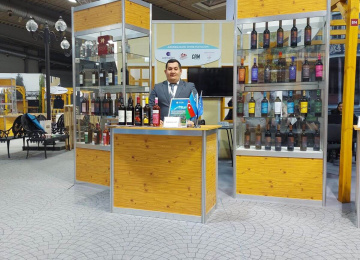
To say that Azerbaijan has a long history of winemaking is an understatement: Archaeological evidence indicates that wine has been produced in the lands that make up the modern state for around 3,000 years, and the Ancient Greek geographer and historian Herodotus noted as early as the 7th century B.C. that the area was known for its wines.
Today, almost all regions of Azerbaijan have large areas devoted to vineyards and wineries. All the same, in this modern, globalized world, and despite fairly large volumes of production, local producers need support to compete with foreign winemakers.
This is especially the case now, in the background of the full-scale invasion and war that Russia has unleashed on Ukraine, which has created shortages of raw materials in the local wine industry.
Support for local chambers and business communities is being provided via the “EU4Business: Connecting Companies” (EU4BCC) project among others, through which Eurochambres, the association of European chambers of commerce, implements practical support measures for businesses. The overall objective is to support sustainable economic development and job creation in Eastern Partnership (EaP) countries by helping their small- and medium-sized enterprises grow.
From grape to trade: Hundreds hectares of vineyards, but exports still too low
Most of Azerbaijan’s wine is produced by larger companies that have access to a wide variety of vineyards, which in turn gives them access to a similarly wide variety of grape types.
This yields opportunities for some imaginative blending of varieties, to produce some distinctive vintages. The country’s best-known products are made by a company called Azgranata, which is one of the largest producers of alcoholic and non-alcoholic beverages in the South Caucasus. The company's organic products are in great demand on the domestic market, and are exported to many countries around the world.
As might be guessed from Azgranata’s name, the company makes wine not only from grapes, but from pomegranates, and it also produces a selection of fruit liqueurs, cognac, and vodka. It grows selected varieties of grapes and pomegranates on its own vineyards and orchards, and its production meets the international ISO 9001 and ISO 22000 quality standards. Azgranata owns 500 hectares of vineyards, and 350 hectares pomegranate orchards – most of which are farmed organically and are certified by the Kompetenz-Zentrum für Wirtschaftsinformatik GmbH (KIWI) institute of Germany. The orchards, fruit production and cultivation methods are inspected regularly by local and foreign specialists.
Yet despite the industry’s broad experience and good infrastructure, there is still much to learn and wide opportunities to develop. Market diversification is among the industry’s biggest aims, and an excellent opportunity has been provided to Azerbaijani wine producers through an EU4BCC initiative called “From grape to trade: building synergies between Bulgarian and Azerbaijani wine exporters.”
This initiative developed as a partnership between Bulgaria’s Plovdiv Chamber of Commerce and Industry and the German-Azerbaijani Chamber of Commerce. The aim of the project is to offer specific market entry opportunities for wine producers to the EU and EaP markets, providing specialized workshops and exchanges to develop management skills, while at the same time introducing the digitization process.
Azerbaijani wine exporters collaborate with Bulgarian producers
Under the project, six Azerbaijani wine exporters presented their products during a study visit to Plovdiv, Bulgaria, from 8-13 March 2022, during which they participated in the VINARIA 2022 wine exhibition in Plovdiv, and attended a business roundtable and masterclass. One of those on the study visit was the head of production of alcoholic beverages at Azgranata, Yusif Lezgiyev.
"In Bulgaria, we met with representatives of two companies,” Lezgiyev says. “It’s hard to sell wine there, because Bulgaria is a wine country itself. Despite this, a certain amount of cooperation has already begun. Due to Russia’s war against Ukraine, there is a large shortage of raw materials for wine production – bottles, labels, and other things. So we started to buy some of these from Bulgaria. All of them are of high quality.”
Bulgaria, a member of the European Union, has long been a prominent wine-making country itself, being the world's fourth largest wine exporter in the 1980s. Since the fall of communism, wine production in the country has been growing again, and now exceeds 100 million litres a year. As part of the project, a study visit along the Azerbaijani Wine Route was organized in March 2022 for eight Bulgarian wine companies. During the visit, the companies attended the 1st EU-Azerbaijan Wine Summit, and a masterclass on Exporting to Bulgaria and Wine Tourism.
In return, Azerbaijani companies had the chance to take part in a contest at the Plovdiv wine exhibition – The Choice of Consumers – in which some of them won prizes and diplomas. Lezgiyev’s company Azgranata was one of the winners. He said that representing his company's products during the exhibition had created an opportunity for it to reach new markets.
"Our products attracted the attention of visitors,” Lezgiyev says. “We saw that there was a chance to export our wine to European markets, and we’re now waiting to see what comes of this.”






